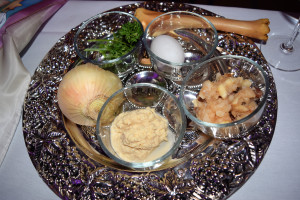
By David Fleet
Editor
Sundown April 10 marks the beginning of Passover, which commemorates the emancipation of the Israelites from slavery in ancient Egypt.
A Seder feast to celebrate the Jewish holiday of Passover, will be at 5 p.m., April 9, hosted by the Goodrich United Methodist Church, 8071 South State Road. Reservations are required by April 1.
The partial Seder meal is presented by Congregation Shema Yisrael, Messianic Jews, or Christians of Jewish descent. A full traditional Seder meal incorporates more Kosher food and runs about three hours.
“The community is welcome to touch some of the Jewish roots of the Old Testament,” said Elder David Goldstein, of the Congregation Shema Yisrael. “We are going to look at the Passover and the Last Supper. We’ll use the elements of Seder, which means order in Hebrew and how this order has been in existence before the time of Christ.”
The meal order will be about 60 to 75 minutes and consist of one sprig of parsley, one small scoop of horseradish on Matzo, one small scoop of charoset, one quarter slice of a hard-boiled egg and grape juice.
Elder David Goldstein will explain how Jesus introduction of Holy Communion so aptly complements the Passover tradition.
“The charoset is a sweet, dark-colored paste made of fruits, apples, raisins and nuts,” he said “The mix symbolizes mortar or mud mixed with straw, which the Israelites used when they were enslaved in ancient Egypt building the pharaoh’s structures. The horseradish, along with the bitter herbs or parsley, brings tears to our eyes to remind us of the bitterness of slavery. The parsley also reminds us of spring and new life. The parsley is dipped in the salt water representing the tears of pain felt by the Hebrew slaves in Egypt.”
The Seder participant experiences the great affliction the Jewish people endured that brought tears to their eyes. A hard-boiled egg represents the holiday offering brought in the days of the Holy Temple, or sacrifices when the temple was still standing. Matzah is unleavened bread made from one of five species of grain wheat. In contrast, leaven is a symbol of sin.
Following the traditional Seder meal will be a modern meal of chicken, potatoes, vegetables, salad, bread and dessert. Children are welcome, and there will be a love offering taken.
